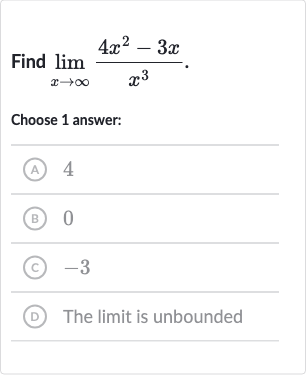Full solution
Q. Find .Choose answer:(A) (B) (C) (D) The limit is unbounded
- Identify highest power of x: Identify the highest power of x in the denominator. In this case, the highest power of x in the denominator is .
- Divide by : Divide every term in the numerator and the denominator by to simplify the expression. This gives us - which simplifies to - .
- Evaluate limits: Evaluate the limit of each term as approaches infinity. The limit of as approaches infinity is because the numerator is constant and the denominator grows without bound. Similarly, the limit of as approaches infinity is also for the same reason.
- Combine limits: Combine the limits of the individual terms. Since both terms approach , the limit of the entire expression as approaches infinity is .
More problems from Integer inequalities with absolute values
QuestionGet tutor help
QuestionGet tutor help
QuestionGet tutor help
QuestionGet tutor help
QuestionGet tutor help
QuestionGet tutor help
QuestionGet tutor help
QuestionGet tutor help
QuestionGet tutor help

